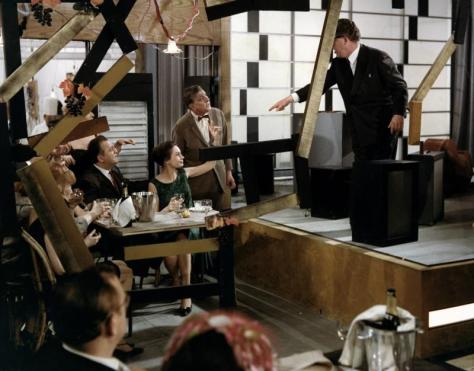
Format: DVD + Blu-ray
Release date: 29 November 2010
Distributor: BFI
Director: Jacques Tati
Title: Les vacances de Mr Hulot
Writers: Jacques Tati, Jacques Lagrange, Pierre Aubert, Henri Marquet
Cast: Jacques Tati, Nathalie Pascaud
France 1953 (re-edited 1978)
88 mins
Title: Playtime
Writer: Jacques Tati
Cast: Jacques Tati, Barbara Dennek, Georges Montant, Billy Kearns, Léon Doyen
France 1967
124 mins
Two holidays: a week at the seaside; and 24 hours in Paris. Tati’s best-loved film, which made him famous; and his magnum opus, which ruined him. Through each, Monsieur Hulot wanders bemused, creating disorder, and shyly paying court to a comely young lady whose demure elegance sets her apart from the high-spirited fun-seekers. But in the years between the two, how the world has changed…
Les vacances de Monsieur Hulot (1953) has been a perfect and delicate source of joy for six decades. It is risky to praise it, lest one seem to trumpet gentle charms that are better left to be discovered. I think of Evelyn Waugh’s words on P.G. Wodehouse: ‘[His] idyllic world can never stale. He will continue to release future generations from captivity that may be more irksome than our own.’ The delight of Hulot’s idyll gains poignancy from an undertone of melancholy.
Tati re-edited Les vacances twice after its initial release. Hulotians who are accustomed to the 1978 version will welcome the opportunity to see the original 1953 version, seven minutes longer, which is included on a second disc of the 2010 BFI reissue.
Playtime (1967), by contrast, is notorious as a folly and a commercial disaster - but how richly it repays attention. It does not give itself easily: it demands concentration, and its emotional dividends are ambiguous. The screen is often full of small-scale action, with no obvious focus, and no clear narrative line. There will be smiles but few laughs. Yet it is unique as a beautiful, subtle, wry meditation on human physical presence in the modern world. If it were to be remade, I can imagine it as a ballet. It awakens the viewer to the extraordinary expressive variety in the movement of people - and indeed of things, for Tati’s miraculous ability to conjure visual humour and poetry from the objects that surround us is as strong here as anywhere in his work.
It is impossible to watch Tati’s films without thinking that they, and in particular his character Hulot, ‘stand for’ something, embody some set of values or some life-aesthetic. But it is not easy, nor perhaps desirable, to define what that is. Hulot is gentle, courteous, kindly, old-fashioned. He is curious about, but challenged by, the new. And Tati’s first two films, Jour de fête (1949) and Les vacances, are surely paeans to modest traditional French ways. But despite the strong vein of sentimental conservatism in Tati’s work, it would be wrong to make a simple inversion and see the next two, Mon oncle (1958) and Playtime, as reactionary critiques of the modern world. Certainly these films show Hulot as puzzled by and alienated in the modern built environment, which plays tricks on him and frustrates his aims. But they are also two of the most joyous and visionary realisations in art of the new beauty, the beautiful newness, that can be found in the urban world. The domestic spaces of Mon oncle still look like design classics today. And ‘Tativille’, the French Cinecittà that he designed and constructed for Playtime in 1964-5 on the outskirts of Paris, was actually a pioneering development, pre-empting and even influencing the futuristic remodelling of French cities. (Only in 1961 were building restrictions in Paris relaxed to allow high-rise planning, and the results were not seen until the latter part of the decade.)
What Tati shows us is the element of comic misrule in our interactions with each other and our surroundings - and how this makes our world more habitable. Chance, mischief, improvisation, serendipity: these, rather than planning, discipline, obedience, authority, are the forces of the universe that help us to find our place in our negotiation between the natural and the constructed world.
Peter Momtchiloff
